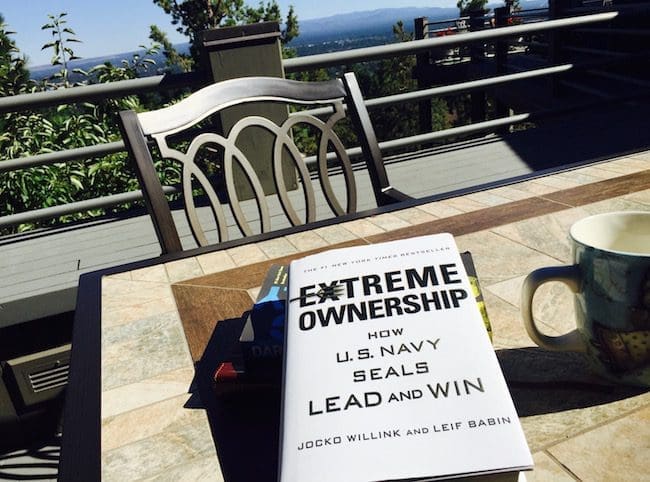After Hubby was diagnosed with late stage prostate cancer, we recruited a full team to help us face down this disease. Gary was the coach; I signed on as assistant coach.
From their best-selling book on leadership, Extreme Ownership: How U.S. Navy Seals Lead and Win, this from former Seals Jocko Willink and Leif Babin:
Leadership is the most important thing on any battlefield … there are no bad teams, only bad leaders.

There are some leadership principles Willink and Babin write about in their book that I recognized in Hubby:
He was courageous but not foolhardy.
Gary didn’t let the thought of dying defeat him, and yet he steered clear of the unproven cancer remedies so many well-meaning friends sent our way. We met our fair share of patients who traveled here and there and tried everything out of desperation. Gary was a courageous and determined warrior, but not rash. He was adamant about wanting to know how much time he had left — not so he could plan a funeral, but to walk back into the physician’s office and say, “I’m still here.”
He was strong and highly-disciplined.
When we packed to attend his family reunion every year, Gary brought his own turkey burger to throw on the barbecue; and I’d make a dessert and salads he could eat. I remember saying once to him, “Honey, it wouldn’t hurt to eat camp food (read: delicious, but not necessarily healthful food) for one weekend.”
“I know,” he countered. “But if I go off point once, it will be easier the next time. And the next.”
He got up at 5:30 every weekday morning for several years and hiked Pilot Butte, a small mountain planted in the middle of our hometown not too far from where we lived. It was two miles round-trip with a 500’ elevation gain. He’d don cleats over his hiking boots in snow and ice, turn on the high-beam lights embedded into the bill of his cap and take off with trekking poles in hand.
One of the side effects of Gary’s hormone therapy treatment (9 years’ worth) was exhaustion. Hubby pushed himself physically when he had every excuse not to.
He was a leader and a follower.
Gary was the one who came up with the idea of presenting our story across the country as a source of hope and encouragement to people dealing with cancer; he was the one who made the decision to discipline himself in the areas of nutrition and physical activity; he weighed in on what we could do in a volunteer role to give back. He wasn’t hen-pecked in these areas; he led in these areas. And yet he listened to my voice when I had ideas or concerns. We were in this battle together, and he knew I was affected by it just as much as he was.
He was quiet, but not silent.
Hubby listened well to his assistant coach (that would be me) and his team members. And yet, he wasn’t afraid to speak his opinion. We ended up firing a urologist once for a variety of reasons. In the last few days of his life, as he was concerned about leaving me in a less-than-desirable financial state, he asked me to dial his siblings. And even though these phone conversations were a bit muddled, he was not silent about his concerns for me.
He was humble, but not passive.
Hubby was a man who didn’t seek to be the center of attention, but he was far from passive. Hospice field nurse Melinda once said he had tenacity. (I think that’s a nice way of saying he was stubborn.) “Maybe there’s still something he wants to teach us,” she said as Gary tenaciously hung on to life longer than expected. This was no passive man.
* * *
I don’t normally read war stories, but there are a couple things I liked about this Navy Seal book: A) It’s written with enough detail and explanation that even I could envision what was taking place and the added difficulties of fighting an urban war; B) The format is easy to read as each chapter contains a battle story, a principle and then an application to the business world; and C) The leadership principles are relevant to most areas of leadership — whether coaching a sport, running a business, being a parent, battling cancer.
Leadership is the single greatest favor in any team’s performance. Whether a team succeeds or fails is all up to the leader. The leader’s attitude sets the tone for the team.
Hubby — a very analytical, computer-programmer, glass-half-empty guy — kept a positive, can-do attitude throughout his years of battling cancer. Our cancer team consisted of good nutrition. Increased physical activity. Our faith. Stress management. Maintaining a positive outlook. Getting plugged into community. Giving back and finding meaning. And of course the medical professionals and treatments.
From time to time, people made comments crediting me (I think because I can be a take-charge person when I need to be). But truth be told, while I may have been the one who shopped and cooked meals and stayed on the new diet with Hubby; the one who trekked high mountain trails on weekends with him (not at 5:30am); the one who traveled and co-presented with him, I was the assistant coach following his lead. Gary was the leader.
At any point, if Hubby had decided his change in diet or the increased physical activity wasn’t worth it, he would have bailed. And there’s nothing I could have done about it.
Which all goes to say that, while the caregiver is critical to the mental, emotional and physical well-being of the patient, it’s ultimately the patient who is the leader.
A note to all who are fighting hard battles — you may have a fabulous support team, but you’re in charge. Take your leadership position seriously. Whether the team succeeds or fails is up to you.
Keep in mind that, when it comes to cancer, success can represent beating it … or success can represent living well and longer than expected with terminal disease.
Gary lived ten years with late-stage cancer. If you ask me, he was highly successful in this leadership position.
What battles are you fighting? Who’s on your team? More importantly, who’s leading your team?
P.S. If you found this post helpful or know someone who’s battling a hard thing, please share, tweet or pin!

Martha Peters
very inspiring words well written indeed…thanks for sharing this in regards how your husband was a “leader” and you were his co=leader. To be a couple in unity and share together and respect each other during such a battle of cancer or any chronic illness is so awesome. Not every couple has that unity and illness in fact can separate the team to the point of being swallowed up by loneliness at a crucial time in which one needs a strong team leader.